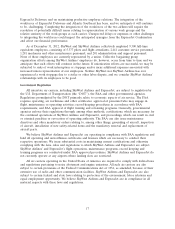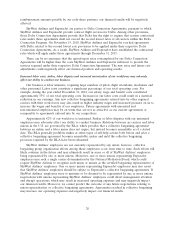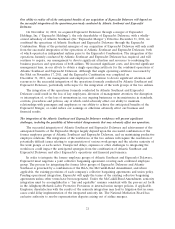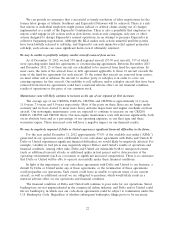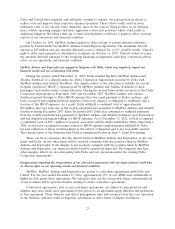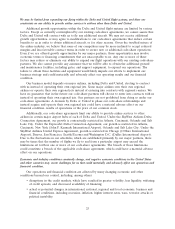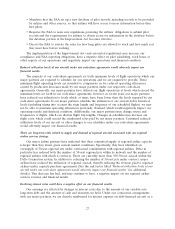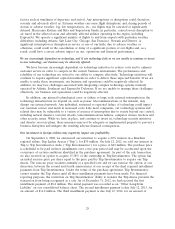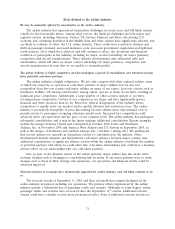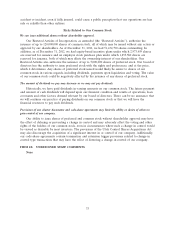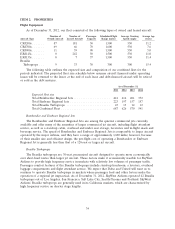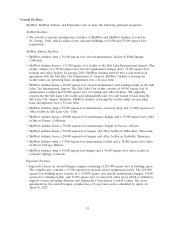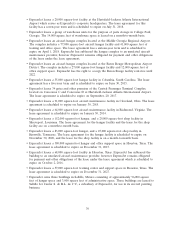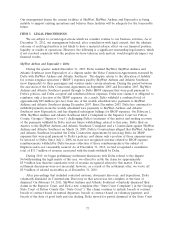SkyWest Airlines 2012 Annual Report Download - page 31
Download and view the complete annual report
Please find page 31 of the 2012 SkyWest Airlines annual report below. You can navigate through the pages in the report by either clicking on the pages listed below, or by using the keyword search tool below to find specific information within the annual report.• Mandates that the FAA set up a new database of pilot records, including records to be provided
by airlines and other sources, so that airlines will have access to more information before they
hire pilots.
• Requires the FAA to issue new regulations governing the airlines’ obligations to submit pilot
records and the requirements for airlines to obtain access for information in the database before
the database portion of the Improvement Act becomes effective.
• Directs the FAA to rewrite the rules for how long pilots are allowed to work and how much rest
they must have before working.
The implementation of the Improvement Act (and associated regulations) may increase our
compliance and FAA reporting obligations, have a negative effect on pilot scheduling, work hours or
other aspects of our operations, and negatively impact our operations and financial condition.
Reduced utilization levels of our aircraft under our code-share agreements would adversely impact our
financial results.
The majority of our code-share agreements set forth minimum levels of flight operations which our
major partners are required to schedule for our operations and we are required to provide. These
minimum flight operating levels are intended to compensate us for reduced operating efficiencies
caused by production decreases made by our major partners under our respective code-share
agreements. Generally, our major partners have utilized our flight operations at levels which exceed the
minimum levels set forth in our code-share agreements, however, in recent years our major partners
have reduced our utilization to levels which, at times, have been lower than the levels required by our
code-share agreements. If our major partners schedule the utilization of our aircraft below historical
levels (including taking into account the stage length and frequency of our scheduled flights), we may
not be able to maintain operating efficiencies previously obtained, which would negatively impact our
operating results and financial condition. Additionally, our major partners may change routes and
frequencies of flights, which can shorten flight trip lengths. Changes in schedules may increase our
flight costs, which could exceed the reimbursed rates paid by our major partners. Continued reduced
utilization levels of our aircraft or other changes to our schedules under our code-share agreements
would adversely impact our financial results.
There are long-term risks related to supply and demand of regional aircraft associated with our regional
airline services strategy.
Our major airline partners have indicated that their committed supply of regional airline capacity
is larger than they desire given current market conditions. Specifically, they have identified an
oversupply of 50-seat regional jets under contractual commitments with regional airlines. Delta in
particular has reduced both the number of 50-seat regional jets within its network and the number of
regional airlines with which it contracts. There are currently more than 300 50-seat aircraft within the
Delta Connection system. In addition to reducing the number of 50-seat jets under contract, major
airlines have reduced the utilization of regional aircraft, thereby reducing the revenue paid to regional
airlines under capacity purchase agreements (See the risk factor titled ‘‘Reduced utilization levels of our
aircraft under our code-share agreements would adversely impact our financial results’’ for additional
details). This decrease has had, and may continue to have, a negative impact on our regional airline
services revenue and financial results.
Declining interest rates could have a negative effect on our financial results.
Our earnings are affected by changes in interest rates due to the amount of our variable rate
long-term debt and the amount of cash and securities we hold. Under our contractual arrangements
with our major partners, we are directly reimbursed for interest expense on debt-financed aircraft as a
27


